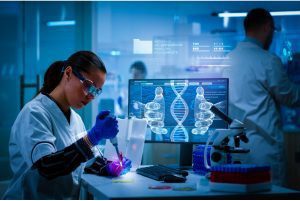
R Programming for Biologists: Beginners Level
Unlocking Data Insights: R Programming for Biologists at Beginners Level
About Program:
Aim: The aim of the program is to empower biologists with essential skills in R programming, fostering a comprehensive understanding of its applications in biological research. This program aims to demystify the complexities of R, providing participants, from beginners to intermediate users, with a solid foundation in utilizing R for data analysis in the biological sciences. Through a combination of theoretical knowledge and hands-on practical sessions, attendees will gain proficiency in data manipulation, statistical analysis, and visualization, enabling them to harness the full potential of R as a powerful tool for extracting meaningful insights from biological datasets. By the end of the program, participants will be equipped with the confidence and skills necessary to integrate R seamlessly into their research workflows, ultimately enhancing the efficiency and depth of their biological analyses.
Program Objectives:
- Biological Data Import: Enable participants to import diverse biological datasets (e.g., genomics, ecology) into R for analysis.
- Bioinformatics Workflow Automation: Instruct on creating automated bioinformatics workflows in R, streamlining data processing and analysis pipelines.
- Data Visualization for Biological Data: Learn the principles of effective data visualization and explore different types of plots suitable for biological data.
- Statistical Analysis: Introduction to basic statistical concepts using R relevant to biological data.
- Handling Biological Sequence Data in R: Learn to import, manipulate, and analyze biological sequence data using R.
- Making Publication-Quality Plots using ggplot2: In-depth exploration of ggplot2, a powerful data visualization package in R.
What you will learn?
Day 1:
- Introduction to R studio
- Data Structures in R- vectors, matrix, lists and Dataframes
- Using and Manipulating Basic R Data Types.
- Control flow- if else, loops, apply
Day 2:
- Installing R libraries for data analysis
- Basic statistical analysis with R
- Correlation, Regression analysis
- Concepts of R tidyverse
Day 3:
- Data Visualization with ggplot2- bar plot, frequency plot, box plot, histogram, pie chart
- Heat map generation
- DNA and Protein sequence analysis with seqinr
- Basics of Bio conductor package
Note: Any OS with latest version of R and R studio installed
Fee Plan
Intended For :
- Educational Background: Applicants should typically have a background in biology, life sciences, or a related field. This could include undergraduate or graduate degrees.
- Experience: While the program is designed for beginners, applicants may be expected to have a basic understanding of biology concepts and terminology.
- Prerequisites: There may be no specific prerequisites for technical skills, but applicants should have a willingness to learn programming concepts and apply them to biological data analysis.
- Computer Literacy: Applicants should have basic computer literacy skills, including familiarity with using a computer, navigating software interfaces, and accessing online resources.
- Motivation: Applicants should demonstrate a strong interest in learning programming skills, particularly for analyzing biological data sets, and a commitment to completing the program successfully.
- Language Proficiency: If the program is conducted in a language other than the applicant’s native language, proficiency in that language might be required.
- Application Materials: Applicants may need to submit materials such as a statement of purpose, a resume or CV, and/or letters of recommendation, depending on the requirements of the program.
Career Supporting Skills
Program Outcomes
- Basic R Proficiency: Participants will have a foundational understanding of R programming, including syntax, data types, and basic functions.
- Data Handling and Cleaning Skills: Participants will be able to import biological datasets into R, clean and preprocess data, addressing common challenges encountered in real-world scenarios.
- Statistical Analysis Competence: Participants will possess the skills to perform basic statistical analyses using R, allowing them to draw meaningful conclusions from biological data.
- Effective Data Visualization: Participants will be capable of creating clear and informative visualizations using R, enhancing their ability to communicate findings visually.
- Introduction to Scripting: Participants will be familiar with scripting in R, enabling them to automate repetitive tasks and create reusable code.
- Application of Statistical Tests: Participants will be able to apply statistical tests relevant to biological research questions, enhancing their ability to make data-driven decisions.
- Practical Experience with Real Biological Data: Participants will have worked with real biological datasets during hands-on exercises and case studies, gaining practical experience in applying R to actual research scenarios.
- Preparation for Intermediate R Topics: Participants will be prepared to explore intermediate-level topics in R programming and more specialized applications in their specific areas of biological research.

